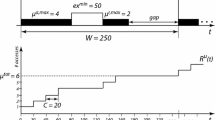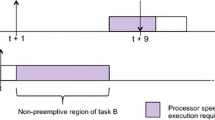Abstract
In the Komodo project a real-time Java system based on a multithreaded Java microcontroller has been developed. A main scheduling policy realized by hardware in the microcontroller core is a new scheme called Guaranteed Percentage (GP) scheduling. This scheme assigns each thread a guaranteed percentage of the processor power thus providing a strict isolation of the threads on the processor.
To prevent processor overload in the dynamic Java environment, fast online feasibility tests are necessary before a new thread is allowed to enter the microcontroller. Starting with the well known Processor Demand Analysis, a new test based on the periodic transformation of the processor workload is developed. This is a sufficient (but not necessary) scalable test, where the number of feasible thread sets found can be controlled by the costs. Furthermore, this test can be stopped, if a given cost or time limit is reached. We additionally propose a modified version of this test, which further reduces the costs and allows an online hardware feasibility test with a polynomial complexity of O(n(n + 1)/2). An evaluation shows, that the tests proposed here are able to find more than 90% of the feasible thread sets and all non-feasible thread sets with costs suitable for online testing.
Similar content being viewed by others
References
Brinkschulte, U., Krakowski, C., Kreuzinger, J. and Ungerer, T. 1999. A multithreaded Java microcontroller for thread-oriented event handling. In Proc. International Conference on Parallel Architectures and Compilation Techniques PACT, Newport Beach, pp. 34–39.
Brinkschulte, U., Kreuzinger, J., Pfeffer M. and Ungerer, T. 2002. A scheduling technique providing a strict isolation of real-time thread. In Proc. IEEE International Workshop on Object-Oriented Dependable Real-Time Systems WORDS, San Diego, pp. 169–172.
Burchard, A., Liebeherr, J. Oh Y. and Son, S. H. 1995. New strategies for assigning real-time tasks to multiprocessor systems. IEEE Transactions on Computers, 44(12):1429–1442.
Gorinsky, S., Marlowe, T., Baruah, S. and Stonyenko, A. 1997. Exact and efficient analysis of schedulability in fixed-packet networks: A generic approach. In Proc. INFOCOM, Japan, pp. 584–591.
Han, C.-C. and Tyan, H.-Y. 1997. A better polynomial-time schedulability test for real-time fixed-priority scheduling algorithms. In Proc. Real-Time Systems Symposium RTSS, San Francisco, pp. 36–45.
Kuo, T.-W., Liu Y.-H. and Lin, K.-J. 2000. Efficient on-line schedulability test for priority driven real-time systems. In Proc. Real-Time Technology and Applications Symposium RTAS, Washington, pp. 4–13.
Kuo, T.-W. and Mok, A. K. 1997. Load adjustment in adaptive real-time systems. IEEE Transactions on Computers, 12(16):1313–1324.
Liu, C. L. and Layland, J. W. 1973. Scheduling algorithms for multiprogramming in a hard-real-time environment. Journal of the Association for Computing Machinery, 20(1):46–61.
Stankovic, J. A., Spuri, M., Ramamritham K. and Buttazzo, G. 1998. Deadline Scheduling for Real-Time Systems. London: Kluwer Academic Publishers.
Zheng, Q. and Shin, K. G. 1994. On the ability of establishing real-time channels in point-to-point packet-switched networks. IEEE Trans. on Communications, 42(2/3/4):1096–1105.
Author information
Authors and Affiliations
Corresponding author
Additional information
U. Brinkschulte was born February 16, 1959 in Mannheim, Germany. He received his M.S. (Dipl. Ing.) in electrical engineering in 1982 and his Ph.D. (Dr. rer. nat.) degree in 1990 from the University of Karlsruhe, Germany.
After receiving his Ph.D., he worked as managing director with the ITV GmbH, Heiligenberg, Germany and as research and development manager with the GAI GmbH, Friedrichshafen, Germany. In 1994 he became professor of computer science at the University of Applied Science in Heidelberg. Since 1995 he is professor at the University of Karlsruhe, institute for process control, automation and robotics. His general research area are distributed real-time systems. His current interests are in self-organization of these systems and organic computing.
Prof. Dr. Brinkschulte is author and coauthor of several scientific books, journal articles and conference papers.
Rights and permissions
About this article
Cite this article
Brinkschulte, U. Scalable Online Feasibility Tests for Admission Control in a Java Real-Time System. Real-Time Syst 32, 175–195 (2006). https://doi.org/10.1007/s11241-005-4679-0
Published:
Issue Date:
DOI: https://doi.org/10.1007/s11241-005-4679-0




